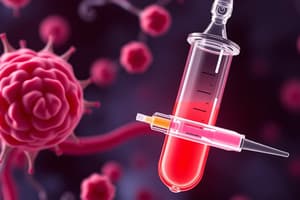Podcast
Questions and Answers
What are the major determinants of glucose appearance in the plasma?
What are the major determinants of glucose appearance in the plasma?
- Insulin, glucagon, amylin
- Gastric emptying, lactate production, amino acid metabolism
- Intestinal absorption, glycogenolysis, and gluconeogenesis (correct)
- GLP-1, GIP, hepatic processes
Which hormone facilitates glycogenolysis during fasting?
Which hormone facilitates glycogenolysis during fasting?
- Insulin
- GLP-1
- Amylin
- Glucagon (correct)
What is the primary source for glucose production during longer periods of fasting?
What is the primary source for glucose production during longer periods of fasting?
- Fats and proteins
- Lactate and amino acids (correct)
- Vitamins and minerals
- Carbohydrates
In the fed state, where is circulating glucose mainly derived from?
In the fed state, where is circulating glucose mainly derived from?
Which process is regulated by hormones such as insulin, glucagon, amylin, GLP-1, and GIP?
Which process is regulated by hormones such as insulin, glucagon, amylin, GLP-1, and GIP?
Which organ is the primary source of endogenous glucose production?
Which organ is the primary source of endogenous glucose production?
What is the role of amylin in glucose regulation?
What is the role of amylin in glucose regulation?
Which hormones act synergistically with insulin to promote glucose storage and inhibit hepatic glucose production?
Which hormones act synergistically with insulin to promote glucose storage and inhibit hepatic glucose production?
How is fructose primarily catabolized in the body?
How is fructose primarily catabolized in the body?
Why is understanding the intricate process of glucose metabolism important?
Why is understanding the intricate process of glucose metabolism important?
Study Notes
Sugar Metabolism: An In-depth Exploration
Introduction
Understanding sugar metabolism is crucial for maintaining optimal health and preventing diseases associated with improper sugar handling. This comprehensive guide delves into the intricacies of sugar metabolism, focusing on the subtopic of glucose metabolism. Glucose plays a central role in the production, storage, and regulation of energy, making it a vital component of our daily lives.
Normal Physiology
The plasma glucose concentration is determined by the balance between the rate of glucose entering the circulation (appearance) and the rate at which it leaves. The major determinants of glucose appearance are intestinal absorption during the fed state, glycogenolysis (glycogen breakdown), and gluconeogenesis (glucose formation from non-carbohydrate sources). These processes are regulated by hormones such as insulin, glucagon, amylin, GLP-1, and GIP.
Glucose Metabolism in the Fed State
In the fed state, circulating glucose is derived chiefly from hepatic processes: glycogenolysis and gluconeogenesis. The rate of gastric emptying determines how quickly meal-derived glucose enters the circulation. Over 8-12 hours of fasting, glycogenolysis is the primary mechanism for releasing glucose into the bloodstream, facilitated by glucagon. Longer periods of fasting promote gluconeogenesis, where glucose is produced primarily from lactate and amino acids.
Regulation of Endogenous Glucose Production
To maintain plasma glucose concentrations within a narrow range, endogenous glucose production is necessary to keep pace with glucose disappearance. The liver is the primary source of endogenous glucose production, as it contains glucose-6-phosphatase, the enzyme necessary for releasing glucose into systemic circulation.
Glucoregulatory Hormones and Their Role
Various hormones play crucial roles in regulating glucose homeostasis. Insulin, derived from beta cells of the pancreas, promotes glucose storage as glycogen and inhibits hepatic gluconeogenesis. Amylin, another pancreatic hormone, also contributes to glucose regulation by slowing gastric emptying and reducing postprandial hyperglycemia. GLP-1 and GIP are released from L-cells of the intestine and act synergistically with insulin to promote glucose storage and inhibit hepatic glucose production.
Metabolism of Other Dietary Sugars
While glucose is the most abundant sugar in nature, other dietary sugars such as fructose, mannose, galactose, xylose, and arabinose have distinct biochemical pathways and organ distribution. For instance, fructose is primarily catabolized by the liver, while glucose is catabolized by various organs including the brain, muscle, and adipose tissue.
In conclusion, understanding the intricate process of glucose metabolism provides valuable insights into maintaining optimal health and preventing diseases associated with improper sugar handling. By appreciating the role of different forms of glucose, their relationship with glycemic response, and the effects on overall energy expenditure, we can make more informed choices about our diets and lifestyle habits.
Studying That Suits You
Use AI to generate personalized quizzes and flashcards to suit your learning preferences.
Description
Test your understanding of sugar metabolism, focusing on the intricate process of glucose metabolism. Explore topics such as normal physiology, regulation of endogenous glucose production, glucoregulatory hormones, and metabolism of other dietary sugars in this comprehensive quiz.




